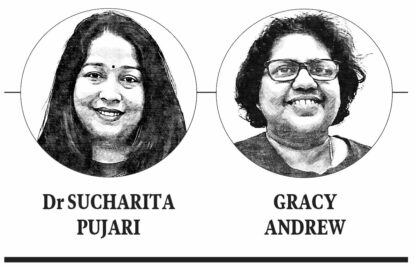Opinion: Mental health must begin in Community
As we mark Mental Health Awareness Month, the 2025 theme — ‘Community’ — reminds us that being part of a safe, inclusive, and empathetic community can be life-changing

By Dr Sucharita Pujari, Gracy Andrew
Every May, Mental Health Awareness Month presents an opportunity to pause and reflect on how societies understand, address and support mental health. The 2025 theme — ‘Community’ — reminds us that mental health isn’t just an individual struggle; it’s profoundly social. Being part of a safe, inclusive and empathetic community can be life-changing. Yet, in India, mental health remains stigmatised, poorly resourced and often misunderstood, even as growing numbers battle psychological distress.
With over 65% of its population under 35, India’s demographic dividend hinges not only on education and employment but also on mental well-being. Communities have to enable inclusion — schools, workplaces, women’s collectives and youth clubs must become spaces where mental health is normalised, nurtured and prioritised. If ignored, this crisis may turn a demographic dividend into a disaster.
A National Conversation
India’s burden of mental illness is staggering. According to the National Mental Health Survey (2015-16), nearly 150 million people in the country need active mental health interventions. Depression, anxiety, substance abuse, and suicide have seen a steady rise, particularly among youth, women and marginalised communities, often intensified by isolation and stigma. Yet, the national discussions on health continue to privilege physical health concerns, leaving mental health relegated to the margins.
The reasons are layered. Cultural silence around emotions, lack of awareness, limited mental health infrastructure and access to care are hugely limited. We have a huge treatment gap ranging from 70 per cent to 92 per cent. India has only 0.75 psychiatrists per 1,00,000 population against the WHO-recommended 3 per 1,00,000.
Public health programmes have only recently begun acknowledging mental health as integral to overall well-being. Yet, mental health remains siloed from other development goals. It is often viewed as an individual affliction rather than a collective community responsibility.
To address mental health meaningfully, we need to expand our lens and shift our perspectives — from individuals to systems, from clinics to communities, and from treatment to prevention and sustained well-being. It is here that the 2025 theme of “community” offers a crucial pathway forward and an important call for action — a path that emphasises how supportive environments and communities can enable mental wellbeing.
Gaps and Urgencies
India has made incremental progress in acknowledging mental health as a public health issue. The Mental Healthcare Act, 2017, affirmed mental health as a right. The National Mental Health Programme (NMHP) and district-level interventions aim to improve access to mental health services, yet these efforts remain underfunded, urban-centric and poorly implemented.
However, for large parts of the country, particularly rural and tribal communities, mental healthcare is practically non-existent. In tribal and marginalised communities, where poverty and cultural exclusion intensify stress, services are either absent or insensitive to local realities.
Moreover, the intersection of mental health and gender is often overlooked. Women bear the brunt of unpaid care work, domestic violence, reproductive health issues and intergenerational trauma. Yet, they often suppress their emotional needs to maintain social harmony. Similarly, men — particularly in rural India — are discouraged from expressing vulnerability due to societal notions of masculinity. Transgender and queer individuals face exclusion and mental health stressors, often lacking access to affirming care.
In rural India, postpartum depression, anxiety from domestic violence and pressure from social norms are growing threats to the mental health of women. High suicide rates among farmers show the close association of mental health with economic hardship. Financial distress, debt and crop failure often leave farmers in cycles of despair.
Without addressing these complexities, mental health interventions will remain inadequate. To create a significant change, efforts should go into finding solutions that are inclusive, culturally sensitive and community-driven.
Why Community Matters
India is a country of collectivist traditions. From self-help groups in villages to housing societies in cities, the idea of community is embedded in everyday life. However, when it comes to mental health, this potential is rarely harnessed. Worse, communities can often become sources of stigma, judgment and isolation stopping individuals from reaching out for support.
But what if communities became the frontline of mental health promotion? Imagine if schools, panchayats, youth clubs, women’s collectives and work spaces transform into safe spaces where people can openly discuss their emotional struggles, seek support and access care without fear.
In a country where mental health services are scarce and inaccessible, community-led models for mental health are not just possible — they are essential.
Policy Recommendations
To respond to India’s mental health crisis, we need a policy anchored in community ownership:
- Integrate Mental Health into Primary Health and Development Programmes: Link NMHP and DMHP with flagship programmes like the National Health Mission, ICDS, and school health initiatives to expand reach and normalise conversations.
- Train Community Health Workers and SHG women as Mental Health Ambassadors: ASHAs, Anganwadi workers and ANMs trusted by communities should be trained to identify distress, offer basic counselling and facilitate referrals. Their presence can de-stigmatise mental health, especially among women and adolescents.
- Empower Panchayats and Urban Local Bodies: Gram panchayats should be incentivised to conduct mental health awareness drives, run community wellness centres, and integrate psychosocial well-being into village development plans. In urban areas, ward-level committees could collaborate with civil society to create community support groups and peer networks.
- Promote mental health literacy through community campaigns: Communities could co-create solutions using folk media and local languages to raise awareness around emotional wellbeing, gender roles and stress.
- Create safe spaces for youth and women: Schools, community centres and hostels should offer counselling and peer-led support groups. Stigma-free environments can encourage people to seek help.
- Engage men and boys to redefine masculinity: It’s important for mental health programmes to question rigid gender roles and support emotional openness among men and boys. Community forums and workplaces can initiate these conversations.
Culture of Collective Well-being
To make mental health a lived reality for all, we must stop viewing it through a narrow biomedical lens and start embracing a more holistic, community-driven approach. India’s cultural fabric, with its diversity, resilience and grassroots institutions, can become a powerful ally in this journey — if we choose to listen, empower, and invest.
Promoting mental health isn’t just for doctors or psychologists. It involves schools, families, panchayats, SHGs, and civil society. It demands not just more budgets, but more belonging, not just more psychiatrists, but more compassion.
As we mark Mental Health Awareness Month 2025, let us affirm that community is the bedrock of well-being. Let India lead in building inclusive communities where minds heal and everyone thrives with dignity.

(Dr Suharita Pujari is Assistant Professor at National Institute of Rural Development and Panchayati Raj, Hyderabad. Gracy Andrew is a clinical psychologist and works as Head, Training, at Indian Institute of Public Health, Hyderabad)
Related News
-
Modi, Macron vow deeper defence, trade partnership
6 hours ago -
Sports briefs: Dharani, Tapasya clinch honours
6 hours ago -
Man arrested for cultivating ganja plants in Telangana’s Adilabad
6 hours ago -
Second successive win for Titans in Samuel Vasanth Kumar basketball
6 hours ago -
Women councillors allege misconduct by Congress in Kyathanpalli
6 hours ago -
Gauhati Medical College doctor lodges FIR alleging harassment by principal
7 hours ago -
Two FIRs filed in Chikkamagaluru after week-long stone pelting on house
7 hours ago -
Viral video shows SUV hitting biker in Dwarka, teenage driver detained
7 hours ago




